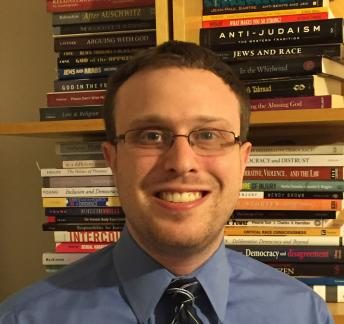David Schraub is Assistant Professor of Law at Lewis and Clark Law School. He responds here to a recent AAUP statement. By framing accusations of antisemitism as generally being predicated on flagrantly absurd premises, Schraub argues, the AAUP letter writers have skipped past the more demanding work of actually responding to the specific claims of antisemitism being made. ‘The AAUP has in effect constructed my entire scholarly agenda not as a form of academic research’ he objects, ‘but as a threat to it’.
Over the past few weeks, as the initial shock of Hamas’ October 7 attack on Israel wore off and a new shock regarding Israel’s bruising response set in, colleges around the country have been wracked by renewed controversies regarding the contours of antisemitism. Many Jewish students, alumni, and faculty members have contended that certain instances of protest and advocacy against Israeli actions in the Gaza Strip have crossed the line into antisemitism. Many Palestinians on campus and their allies have been equally fervent in rejecting the charge, contending that the claims of antisemitism are actually attempts to target free speech and legitimate criticism of Israel.
Last week, in a statement released this week discussing challenges to academic freedom posed by the current conflict in Israel and Gaza, the American Association of University Professors waded into this debate by stating that it ‘rejects the characterisation of pro-Palestinian speech or critiques of the Israeli state as invariably antisemitic.’ This language—’invariably antisemitic’—appears advised, and echoes a common theme purveyed in public discourse about the intersection of antisemitism and Israel. A few weeks earlier, a group of ‘Jewish writers, artists, and activists’ drafted an open letter published in N+1 Magazine titled “A dangerous conflation” which opened by ‘disavow[ing] the widespread narrative that any criticism of Israel is inherently antisemitic.’ And indeed, this framing—attacking the view that any criticism of Israel is inherently antisemitic—predates the current round of hostilities: an open letter from Independent Jewish Voices in Canada in 2021 complained that the widely-used IHRA antisemitism definition ‘is being used worldwide as a tool to assert that criticism of Israel is inherently antisemitic.’
These letters and press releases are speaking an incontestable truth. Criticism of Israel is not inherently or invariably antisemitic. But some truths are so obvious that they loop back around into falsity. And the AAUP, in adopting this framing, actually endangers essential academic freedom values for both scholars of antisemitism as well as Jewish academic community members, who have to be free to make good faith contentions that some events, practices, arguments, and ideologies concerning Israel are indeed antisemitic. Just as with claims about racism, sexism, Islamophobia, colonialism, and similar sins, we can expect that many of these allegations will be contentious and some of them may turn out to be unsustainable. But that does not remove them from the ambit of open academic discussion.
To be sure, the position that critiques of the Israeli state are ‘invariably’ antisemitic is one that is impossible to adhere to in good faith. But that impossibility is so obvious that it raises the immediate question of whether anyone actually is making such a claim? When I read a sentence objecting to the ‘narrative’—indeed, a ‘widespread narrative’, a narrative supposedly so commonplace it demands intervention from the AAUP—that any criticism of Israel is inherently or invariably antisemitic, my first thought is to wonder who exactly the writers are arguing against? Who is so foolish, so blinkered, that they actually believe that any criticism of Israel is invariably antisemitic?
No matter where one looks along the political spectrum, falsifying examples abound. It was only months ago that we witnessed historic protests, in Israel and around the world, vocally condemning the Israeli government’s proposed efforts to neuter the state’s judiciary—criticism of Israel that even where disagreed with was rarely if ever called antisemitic. The hammerlock Israel’s ultra-Orthodox rabbinate holds over large swaths of civil society, and the ensuing discrimination against non-Orthodox Jews, has long been a source of denunciation by liberal Jews in the diaspora. And many people, Jewish and not, have bitterly indicted the Netanyahu government’s response to Hamas’ attack for fecklessness and incompetence—raining down death and destruction on Gaza with seemingly little plan other that trying to delay his own political reckoning for as long as possible. In my case, even as I conceded that Israel was left with few good options in the wake of Hamas 10/7 attacks, I nonetheless declared that ‘this dilemma is certainly beyond the capacities of the pathetic rabble of fascists and lickspittles that comprises Netanyahu’s coalition.’ Vituperative language—and yet, I was not accused of antisemitism.
Now of course, it is fair to say that these ‘criticisms of Israel’ are not the ones that the letter writers had in mind when they complained of criticism of Israel being characterised as antisemitic. They were not thinking of criticisms of Israel’s domestic policy arrangements, they were not thinking about religious liberty issues afflicting non-Orthodox Jews, and they certainly were not thinking of criticism of Israel’s wartime behaviour (however passionately expressed) that nonetheless holds sympathy for Israel’s genuine security dilemmas. They were envisioning meatier fare. But this is precisely the point: it is not the case the any criticism of Israel is called inherently antisemitic. Rather, specific criticisms in specific contexts are called antisemitic for specific reasons. These reasons may, of course, be well- or ill-taken. But even the most poorly-reasoned assertion of antisemitism almost certainly does not rely on a fallacy quite so blatant as a belief that any criticism of Israel is inherently antisemitic.
This may seem like splitting hairs. It isn’t. Rather, it identifies a dangerous conflation of its own. By framing accusations of antisemitism as generally being predicated on flagrantly absurd premises, the letter writers can skip past the more demanding work of actually responding to the specific claims being made. And precisely because the refutation ‘criticism of Israel is not inherently antisemitic’ literally responds to no one, it can be wielded against anyone and everyone. All contentions of antisemitism tied to claims about Israel can be dismissed through this reply—the well-reasoned, the ill-founded, and everything in between.
Put differently, the statement ‘criticism of Israel is not inherently antisemitic’ is obviously true, but the statement that any non-trivial number of individuals believe that ‘criticism is of Israel is inherently antisemitic’ is obviously false. But this falsity permits the valence of our discourse about antisemitism to be reframed. The problem is no longer antisemitism itself, but rather the way ‘antisemitism’, as a concept, is allegedly abused to victimise innocent bystanders.
As an academic who studies antisemitism as a central area of research, it was deeply disheartening to see the AAUP in particular miss the threat that their framing poses to my ability to pursue my scholarship freely, given that by necessity my research will regularly entail making claims about antisemitism that others might not agree with. Any professor, but especially any Jewish professor, who researches antisemitism is well familiar with the reflexive scepticism that our field of study is often greeted with—the almost instinctual demand for assurance that we’re not one of ‘those people’ who calls anything and everything antisemitic. ‘Anything and everything,’ in this context, means ‘anything that I don’t already think is antisemitic.’ And so if I depart from their preconceived notions, the conclusion they draw is not that I’m making a contribution to an academic debate that they are not yet prepared to agree with, it’s that I’m engaged in a project of intentional political slander and defamation.
When I, as part of my scholarly research, make a claim that a given practice or ideology or assertion is antisemitic, I do not expect my audience to give me unquestioning deference or blind acquiescence. I do expect that my audience will not assume I’m making a transparently bad faith argument to score cheap political points. But the AAUP has in effect constructed my entire scholarly agenda not as a form of academic research but as a threat to it. Antisemitism, under their view, is not something we debate; it’s something that’s used to close off debate. And again, because there is nobody (in academia or out) who actually takes the absurd stance that ‘critiques of the Israeli state [are] invariably antisemitic,’ the AAUP’s concerns can only be directed towards those who believe that critiques of the Israeli state can ever be antisemitic. Whether by design or not, the AAUP has placed every academic who seeks to make assertions of antisemitism under a pall of suspicion.
When discussions of antisemitism are treated as something that stands outside the normal patterns of academic life—not a scholarly claim, but a threat to scholarship—the result can only be a shutting down of legitimate, even essential avenues of research and debate. Consider a recent presentation by philosopher Ruadhán Flynn at the University of Vienna, ‘On Palestine, Antisemitism, and Academic Silence.’ Flynn framed his talk around the same trope the AAUP did: the notion that ‘anyone making any criticism of the actions of the Israeli government will be accused of antisemitism,’ and the concurrent desire to reject the position that ‘any and all criticism of Israeli state policies or actions is necessarily an expression of antisemitism.’ But Flynn was not, unsurprisingly, actually speaking about any criticism of Israel, but rather two considerably more specific criticisms of Israel—the claim that it is an apartheid state, and the claim that it commits genocide.
To both claims, Flynn says that one can disagree in good faith as to whether either the apartheid claim or the genocide claim are true or not. ‘Let’s have that conversation,’ he urges. However, he says, neither of them can be said to be antisemitic. As it happens, it turns out the most American Jews agree with Flynn on both scores: even before the latest round of hostilities, while solid majorities of American Jews disagree that Israel either is an apartheid state or is committing a genocide, most did not think either claim was antisemitic (this stood in contrast to the position that Israel has no right to exist, which overwhelmingly was viewed as antisemitic).
But as an antisemitism scholar, I’m not sure there’s nothing that can validly be said relating the charge of, say, genocide to inferences of antisemitism. The allegation that Israel is committing genocide long predates the events of the past month, and in the past I’ve argued that the ubiquity of the ‘genocide’ claim at least in part is traceable to frustration that Jews get to ‘claim’ the Holocaust and can use it to contest default hegemonic narratives of gentile supremacy and Jewish subordination.
To be sure, the terrain has changed over the past month, and so I will absolutely concede one can disagree with this analysis’ applicability to present affairs. As Flynn says, ‘let’s have that conversation.’ But while I may be wrong about the connection between ‘antisemitism’ and genocide allegations (either in 2016 when I initially made my argument, or as overtaken by events in 2023), if I am, it is not because I am so foolish as to believe that ‘any criticism of Israel is inherently antisemitic.’
The larger point here is that the issue of antisemitism is part of the conversation, it is not something that can be surgically excised from it. The late Critical Race Theory scholar Jerome McCristal Culp, Jr. made this same point in response to liberal critics who were willing to have debates over issues like affirmative action and racial inequity so long as charges of ‘racism’ were taken off the table: he labeled this insistence as one demanding ‘a coerced argument … that concedes the key intellectual contest.’ It’s one thing to say it’s not inherently racist to criticise, e.g., affirmative action programs. It’s another thing to say we can even intelligibly discuss affirmative action programs if the issue of ‘racism’ is artificially removed from consideration. Put simply, those of us who research and write on antisemitism cannot do our jobs if our job is constructed as a form of illegitimate cheating or illiberal academic censorship. Academic freedom includes, and must include, the freedom to call things antisemitic even when other people think we’re wrong to do so.
And in many ways, the austere confines of scholarly research is the arena in which Jews are least vulnerable. At least there, norms of academic freedom and research ethics still stand as at least a partial bulwark against the silencing of speech about antisemitism—even if these norms are sometimes honoured in the breach. In other contexts, where we’re more reliant on general social bonds of trust and good faith, the proliferation of the narrative that antisemitism claims are regularly a bad faith ploy to silence legitimate criticism of Israel can exert terrible pressure on Jews who are trying in good faith to articulate their own experiences and defend their dignity both on campus and in the wider world. A colleague of mine at another university, for instance, recently spoke of a situation where she had to remove a student from class for repeated antisemitic disruptions. The incident had nothing to do with Israel—the student refused to engage with assigned readings in favour of old-school, far-right declarations about supposed Jewish control of the media, Hollywood, finance, and so on. But my (untenured) colleague was nonetheless beset with anxiety—if the story got out of ‘Jewish professor removes student from class for “antisemitism’’’, how many people would just assume it was a case of blunt censorship on behalf of Israel? What would happen if the student did try to give his remarks just a little more of a fig leaf (‘Zionist’ control instead of ‘Jewish’ control)? One would hope that her colleagues in academia would trust her professional judgment and her ability to distinguish between a student making a controversial argument and naked antisemitic trolling. But the unrelenting narrative that just assumes that when Jews speak of antisemitism there’s a decent chance they’re maliciously trying to shield Israel from all criticism gives her worries genuine weight.
Students are in an even more vulnerable position. I’ve felt very lucky that my home institution, while certainly experiencing its share of tensions, has not witnessed any of the major blow-ups that have made national headlines. But even without the high-profile incidents of assault or terrorist threats, there remains a more subtle yet pervasive problem—Jewish students feel dismissed. They want to have an open conversation about what’s going on in the world and with their families, to speak of and sort through sufferings of Israelis and Palestinians, and they’re finding that their contributions are ignored if not actively derided.
The students I’ve talked to are decidedly not all-in rah-rah supporters of the Israeli government. They do not believe that ‘any’ criticism of Israel is antisemitic; they typically have a laundry list of their own criticisms they’re happy to share. But what they report back to me is that if they try to forward any claims about antisemitism, if they even advance the possibility that some of their fellows’ rhetoric or practices or behaviours (up to and including outright praise for Hamas’ massacre of Israeli civilians) could potentially be antisemitic, they’re immediately shut down—and the preferred rhetorical move to justify the shut down is none other than the venerable ‘criticism of Israel is not inherently antisemitic.’ This declaration is not, it turns out, the last resort deployed only against the most unreasonable and inveterate far-right Zionists. It is rather the move of first resort, the initial response and too often the only response to any claim made about antisemitism, regardless of its merits.
The brute fact is that ‘one cannot simultaneously purport to oppose antisemitism and assert that Jews are usually lying about their own experiences with antisemitism. That circle will never be successfully squared.’ This is antisemitism in its epistemic dimension—the pervasive, unrelenting, uncompromising insistence that Jews speaking about our own experience are deluded, deceitful, or outright running a scam. Where this view pervades, our orientation towards antisemitism claim should not be one of open receptivity and fair-minded consideration, but rather wary alert to ensure that these likely bogus charges don’t claim more innocent victims.
To be clear, not all claims about antisemitism are good claims. And we might suspect that certain contexts—to name a few: highly charged social controversies, violent geopolitical conflicts, young students whose political beliefs are yet to be fully developed—may be more prone to generating bad claims than others. One can certainly sympathise with the frustration of people who are faced with allegations of antisemitism when they earnestly believe the claim is meritless. But it is worth stressing just how normal that all is. In civil society and certainly on university campuses, there are many cases where things are called racist that many people sincerely do not believe are racist. The same is true for claims about sexism, and colonialism, and Islamophobia, and any number of analogous oppressions. Ideally, the way we respond to that conflict is by doing our best to consider the claim with charity and curiosity, with an open-mind and also with rigor. We ought not reflexively accept the claim as automatically true, nor should we instantly dismiss it as necessarily false. And at the end of our conversation, sometimes we’ll conclude the claim has merit, sometimes we won’t; sometimes, disagreements may simply remain intractable. But what we should not do is simply declare, in advance, that these claims somehow stand outside the walls of what is permissible to enter into the arena of intellectual consideration. Antisemitism claims deserve the same treatment.
And as difficult as it is, I do believe these conversations can occur. I teach a law school seminar on theories of anti-discrimination—a topic that unavoidably covers hot-button, fraught, and deeply contested issues of tremendous social import. At the start of the semester, I lay out two ground rules for discussion. First, I say that it is impossible to have a class on anti-discrimination where people are forbidden from calling things, e.g., racist. And that means that it’s possible that some arguments you, the students, make or positions you hold may be called racist. That’s not impermissible. We have to allow that. But the second rule is that a claim of racism does not end a conversation, it begins one. Just like any other assertion or argument that might be proffered in class, a claim of racism is just that—a claim, to be analysed, debated, and dissected in full. And that means it’s possible that some arguments you, the students, make asserting that something is racist will be contested and pushed back on. ‘Racism’ is not a trump card. It sits inside, not outside, of the normal boundaries of scholarly discussion.
Even as the perceived campus climate for having robust and open discussions on racism and other like oppressions has decayed, I’ve been exceptionally pleased with the calibre and quality of the discussions I’ve had in my seminars. Students, it turns out, are fully capable of having these hard conversations fruitfully. And I see no reason why antisemitism should be different. We can have hard, contested conversations about antisemitism. But in order to begin, we must be free to call things antisemitic.






































